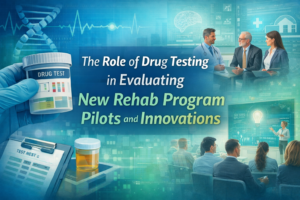How Long Does Ethyl Glucuronide Stay In Your System?
If you’re wondering how long ethyl glucuronide stays in your system, you’re not alone. Many people have questions about alcohol, health, and recovery. Whether you’re a patient, on probation, going through a sobriety check, or simply looking for facts, this guide can help.
Let’s talk about ethyl glucuronide, or EtG, in a way that’s simple to understand.

What Is Ethyl Glucuronide (EtG)?
Ethyl glucuronide is a metabolite. That means it’s something your body makes after you drink alcohol, like wine, beer, or standard drinks.
When alcohol enters your body, your liver breaks it down. A part of this process makes EtG. It’s a biomarker, which is like a clue that shows someone drank alcohol recently.
Doctors and labs can test for EtG in your urine, blood, saliva, and even perspiration.
How Long Does EtG Stay in Your Body?
EtG can stay in your body for a long time compared to alcohol itself.
In urine, EtG can be found for up to 80 hours after drinking.
In blood, it can stay for 1–2 days.
In hair, it can show alcohol use for up to 90 days.
In saliva, it stays for 12–24 hours.
So even if you feel fine or sober, your body may still show evidence of drinking.

Why Is EtG Testing Used?
EtG testing is used when it’s important to know if someone has used alcohol, even a small amount. It’s often used in:
Probation or legal cases
Child custody evaluations
Outpatient programs and rehab
Dual diagnosis treatment
Domestic violence recovery
Physician or health monitoring
Lawyers and physicians often rely on EtG tests to check for relapse or ensure sobriety.
How Is EtG Made in the Body?
When alcohol is broken down in the liver, enzymes help change it. These enzymes are:
Alcohol dehydrogenase
Aldehyde dehydrogenase
These enzymes turn alcohol into acetaldehyde, then into acid and water. A small part of the alcohol also binds with a substance called glucuronic acid, creating ethyl glucuronide.
What Affects How Long EtG Stays in the System?
There are many things that affect how long EtG stays in your body:
1. Amount of Alcohol Consumed
Binge drinking or having many drinks can lead to more EtG in the system, which means it stays longer.
2. Body Composition
Things like fat, weight, and adipose tissue can affect how your body processes alcohol.
3. Gender
Women and men may process alcohol differently due to hormones and body fat.
4. Diet and Nutrition
Low carbohydrate intake or poor nutrition can affect your liver and how it handles alcohol.
5. Exercise and Hydration
Drinking water, exercise, and avoiding dehydration may help your body remove EtG faster.
6. Liver and Kidney Health
If you have hepatitis, cancer, or problems with your liver or kidneys, alcohol and EtG may stay longer in your system.
EtG Testing vs Other Alcohol Tests
There are different ways to test for alcohol:
EtG urine test: Most common. Checks for drinking in past 3–4 days.
Blood test: Shorter window. Often used in emergencies.
Phosphatidylethanol (PEth) test: Another biomarker that lasts longer.
Carbohydrate-deficient transferrin (CDT): Checks for heavy drinking over time.
Mass spectrometry: A lab method used to find small amounts of EtG and other chemicals.
Can Hand Sanitizer or Mouthwash Cause a Positive EtG Test?
Yes, sometimes. Products like hand sanitizer, mouthwash, or food cooked with fermentation (like certain breads) can cause small amounts of EtG.
But most EtG tests are designed to notice high levels that come from drinking alcohol, not just everyday products.
Still, if you’re in recovery or under probation, be careful with alcohol-based products.
Myths About EtG and Alcohol Testing
Let’s clear up some myths:
Myth: “If I sweat it out, the alcohol goes away faster.”
Fact: While perspiration helps a little, it doesn’t remove EtG completely.Myth: “If I drink coffee or energy drinks, it will mask EtG.”
Fact: There is no proven way to hide EtG from a test.Myth: “You can trick the test with certain foods or drinks.”
Fact: Research shows that EtG tests are hard to fool.
How EtG Testing Helps with Recovery
EtG testing helps support people in recovery programs. It gives physicians, psychiatry teams, and counselors real facts.
If someone is in a dual diagnosis program (for mental health and addiction), EtG tests can show whether the person is staying sober. This is very helpful for:
People recovering from opioid or fentanyl use
Teens or adults in an outpatient program
Patients dealing with anxiety, stress, or depression
The Role of Mental Health in Alcohol Use
Many people drink alcohol to cope with feelings like anxiety, stress, or sadness. But this can lead to bigger problems.
Alcohol affects the brain, changes behavior, and can even lead to mental health issues. If someone has both mental illness and substance use, they may need special care called dual diagnosis treatment.
This includes therapy, support groups, and often EtG testing.
What to Do If You Relapse
If you slip and drink again, don’t give up. A relapse is common in recovery, and it doesn’t mean you failed.
Talk to your therapist, physician, or support team. You might need changes to your:
Outpatient program
Psychology sessions
Nutrition plan
Exercise routine
Everyone’s path to sobriety is different.
Alcohol and the Opioid Epidemic
Many people with opioid use issues also drink. Mixing alcohol with fentanyl, opioid, or methamphetamine is very dangerous.
Programs that treat both alcohol and drug problems use EtG tests to keep patients safe. Some may use naloxone to reverse opioid overdose if needed.
The Food and Drug Administration (FDA) supports safe tools to help people recover.
Tips for Staying Sober
Drink lots of water
Eat healthy food
Talk to a counselor
Join a recovery village or support group
Avoid triggers like bars or parties
Focus on your mental health
Manage your stress

When to Talk to a Doctor
If you have questions about alcohol, EtG tests, or your health, talk to a physician or addiction specialist. They can help you with testing, recovery, and creating a plan that’s right for your body and mind.








